- Home
- Nathan Lowell
Home Run Page 10
Home Run Read online
Page 10
Zoya stepped around the bow of the Peregrine and held her hands above her head, palms forward.
Natalya followed her example.
The woman still stood near the door, her sidearm pointed in their general direction. “State your names and business.”
“Zoya Usoko. We’ve come to find out what happened here.”
“Natalya Regyri. This is my ship.”
“That’s the Peregrine,” the woman said.
“Yes.”
“Your name is Regyri.”
“Yes.”
“Who gave it to you?”
“What? The ship?”
She nodded.
“My father.”
“What’s his name?”
“Demetri.”
She nodded and looked at Zoya. “You flew hauler?”
“Yes.”
“What ship?”
“Zvezda Moya.”
She nodded and lowered the sidearm. “Come on, then.”
“We have another person in the ship. An engineer. He’s come to assess the damage.”
She looked at the ship and gave a little nod. “He’ll be safe there.” She turned and exited the bay through the airtight door.
Natalya looked at Zoya who shrugged and followed the woman.
“Does everybody but me know the name of your hauler?” Natalya asked.
Zoya shook her head. “Only Usoko employees.”
They entered the next room and found the woman seated behind a desk, the gun beside her keyboard.
“What can I do for you today?”
Zoya glanced at Natalya before engaging the woman. “We’ve come to assess the damage and get you some help.”
The woman nodded. “The station is gone. Everybody is gone.”
“You’ve been alone here since then?”
She nodded again. “I was on can duty. The Mindanao had a shipment of frozen food and traded it for a can of refined iron.”
“Do you need food? Water?” Zoya asked.
She shook her head. “We have supplies here. I have supplies here, I should say. The crew was all out swapping the cans.” She sighed. “I watched. I couldn’t believe it. I watched as the whole crew got incinerated in the fireball. Can and all. When it cleared everything was gone, blasted out in all directions.”
“How can we help you?” Zoya asked.
She stared at Zoya, her eyes flat and dark. “I’m cold.”
Zoya nodded and started around the desk. “Let us take care of you.”
The woman stared at Zoya. “You’re really her.”
“Her?”
“My star.”
Zoya smiled and reached for the woman’s shoulder. “I am the granddaughter of Konstantin and Madoka Usoko. Yes.”
“Then you can save us.”
Zoya shook her head. “I can only try. Will you let me try?”
The woman smiled, the smile crinkling the lines on her face making her seem, suddenly, much older than Natalya had first thought. “I’m cold,” the woman said, and fell forward into Zoya’s arms.
Chapter 19
Smelter Seventeen:
2368, February 8
Zoya lowered the woman gently to the deck. “Shock. Find a blanket.”
Natalya raced back to the ship and stripped her own bunk of blankets and pillow. She grabbed a couple of water packs from the cooler in the galley and saw Bean still sitting in the same position, staring into the void. “Hey, Rob. Move it. We need your help.”
He blinked several times and punched his seat belt release. “Yes. Sorry. Of course. What can I do?”
Natalya shook her head and cursed under her breath. She thrust the blanket and pillow into his arms. “Take these. Zoya’s inside. Fast.”
He nodded and seemed to come to himself. He wrapped his arms around the bundle and bolted for the lock.
Natalya tossed a couple of food packs into the microwave and punched them up before going back to her stateroom and pulling more blankets from the drawer under her bunk. The microwave beeped. She almost burned her fingers on the packaging as she took them out. She slapped the blankets on the counter and laid the hot meals on top, wrapping a fold over the top to hold them in place before she followed Bean.
She found Zoya sitting on the deck beside the woman’s head and Bean holding her feet up in his lap on top of the pillow. The blankets seemed pitifully little comfort against the enormity of the situation. Zoya looked up as Natalya unwrapped the meals from the blankets and spread the blankets over the recumbent form.
“You brought dinner?” Zoya said, confusion crinkling her face.
Natalya placed the hot meals on the woman’s torso and flipped a corner of the top blanket over them. “I brought heat.”
Zoya grinned. “I’d never have thought of it.”
“We don’t have anything like a heating pad aboard. Never needed it.”
“This works,” Zoya said, laying the back of her hand against the woman’s forehead. “She’ll come around soon, I suspect.”
“Good,” Natalya said. “She can eat one of those meals before it cools off.” Natalya looked around the office space. “I don’t see any evidence of food prep.”
“Take a look around,” Zoya said. “There’s got to be facilities here. A head. Maybe a small galley.” She used her chin to point at the gun beside the keyboard. “Secure that somewhere and then see if the console is logged in.”
Natalya pulled the gun off the table, pulled the magazine, cleared the chamber, and checked the safety. “Frangible rounds. At least she wasn’t going to punch a hole in the bulkhead.”
Zoya grunted.
Natalya tucked the weapon in the leg pocket of her shipsuit and placed the magazine on the opposite leg before scooting around to the other side of the console to sit on the chair their patient had so recently fallen out of. She pressed the space bar and the screen lit up.
“Looks like scheduling and routing,” Natalya. “Mindanao at the top. Shows loading in progress.”
“So if they swapped the cans before the fusactor blew, the food’s gone,” Zoya said.
“Yeah. Looks like. We should be able to tell by the can number without having to actually break into it.”
Zoya nodded. “True. Without their boat, they’re not getting out of there anytime soon, either.” She shook her head. “What were they thinking?”
“Maybe they weren’t,” Natalya said, staring at the screen, trying to make sense of the data. “This says we’ve got another ship due to dock in, like, three days.”
“That’s probably the one that bugged out,” Zoya said. “What was on it?”
“Machine parts.”
“Probably drill heads and the like,” Zoya said. “Those barges burn through them pretty quickly. Mining is hard on the equipment. Won’t matter in the short term. What ship was it?”
“Pride of Paisley.”
Zoya laughed. “That’s not a name I’ll forget. I’ll pass it to Pop-pop when I see him again. What’s next?”
“Mixed freight. Looks like a tractor. Three cans. One of hydroponic nutrient. One of mixed printer stock. One of scrubber filters. Due in three weeks.”
“Too bad we don’t have a printer,” Zoya said.
“Or a hydroponics setup,” Natalya said.
“That too.”
“What are we going to need, Rob?” Natalya said.
He looked up, blinking like he’d been asleep.
“Are you all right?” Natalya asked.
His gaze darted around the room for a few moments before he focused on her face. “Yes.” He seemed surprised at his own answer. “Yes, I believe so.”
“You sure? You’ve been kinda drifty for the last little while.”
He looked at the woman’s feet in his lap and shook his head. “I’m ... I guess I’m a bit overwhelmed.” He looked around. “All this. It’s ... unexpected. A week ago I was working out the best ratios of mass to head for the grinders. Now I’m sitting in a marshaling yard for a st
ation that I didn’t know existed—and doesn’t exist anymore—in a part of space I thought was uninhabited.” He shook his head again.
“Well, to be fair,” Natalya said, “I think a week ago, we’d just grabbed you off Grinder Eight and scarpered off from a pair of TIC patrol craft, but I take your meaning.”
He looked up at her again, his eyes showing signs of life for the first time in days. “We need machined parts—or a milling machine to make them. We’re going to need airlocks and pumps, the associated electronic sensors and actuators. We’re going to need pressure regulators. A whole environmental setup, for that matter. A wide-bed printer for things we can print, and a couple of nano-scale printers for the electronics we’ll need. If we can adapt one of those cans out there, that would cut down on some of the construction. We need food, cooking facilities, storage for the food. We need people. Cooks, the whole range of support staff from mechanics to closed ecology environmentalists to management.”
“Anything else?” Zoya asked with a grin.
“That’s just off the top of my head. There’s probably a lot more since this station has basically been wiped out, except for the barges and haulers out there.”
“That’s the problem,” Zoya said. “If it weren’t for them, we could just arrange to pick everybody up and take them out of here.”
Natalya swiveled her chair to look at Zoya. “It’s easier to rebuild the base than to take some people out?”
“It’s not just the people. It’s the ships. Those barges aren’t jump-capable. Usoko has a couple of barge carriers but it would take months to get them all out. I suspect it took stanyers to get them all in here. It wouldn’t surprise me to learn this facility was active before I went to the academy.”
“Think your grandmother had one of these Toe-Hold stations in mind when she suggested you take over one of the outposts?” Natalya asked.
Zoya nodded. “Probably. Maybe even this one. She plays a long game.”
Natalya laughed. “She got her wish but I’d bet she never envisioned this.”
Zoya nodded at the computer. “That thing have an inventory of cans in the yard?”
“Yes,” the woman said, struggling to push herself up. “It does.”
Zoya held the woman’s shoulders down. “Easy. Just take it easy for a little longer. You passed out. When was the last time you ate?”
She lay back against the deck. “I’m not sure. Yesterday? Maybe.”
“Are you feeling queasy? Have a headache?”
“Headache, yeah.” She winced and pressed a hand to her temple. “Why’d you have to mention it?”
Zoya grinned. “Sorry, just trying to make sure you’re not in some other kind of distress. You’ve been through too much already. I’d kick myself if I overlooked something obvious.”
The woman nodded and winced again. “Shouldn’t have nodded, but I need to get off this deck. It’s hard as hell.”
Chapter 20
Smelter Seventeen:
2368, February 8
The woman sat back in her chair, pushing the meal pack away. “Thank you,” she said. “For everything.”
“Feeling a bit better?” Natalya asked.
She nodded. “I’m Kimberley Ahokas, by the way.”
“Natalya. You already know Zoya. This is Rob Bean,” Natalya said pointing at him.
“Sorry about the harsh greeting. What do we do now?” she asked.
Zoya looked up from the inventory. “The next ship isn’t due here for three weeks? I don’t suspect you get many drop-ins.”
Ahokas shook her head. “Never.”
Zoya nodded. “Sounds about right, but we need to find a comms node. The folks back home are probably pulling out their hair because they haven’t heard from us yet.”
Natalya said, “We haven’t been here that long. Just seems longer.”
“Probably so,” Zoya said. “That doesn’t change the reality that we need machines and materials we don’t have.”
“And people,” Bean said. “If we’re going to rebuild, we’re going to need deep-space construction workers. Hardsuits in particular. We can probably cobble together something here out of Barbell cans but we’re going to need more than that to re-establish the station.”
“Good point,” Zoya said. “Before we get too far down that wormhole, we need to check in.”
“How soon before the barges begin running into trouble?” Natalya asked.
“Rock Ripper has a couple of weeks. The others soon after,” Zoya said. “We’re going to be up to our armpits when the barges on the far side of the primary come back. I suspect, by then, all the barges on this side will be full and waiting to unload.”
Natalya sighed. “And we can’t unload them.”
“Well, we could,” Ahokas said. “The problem is we have a limited capacity to trans-ship raw ore and we’re almost full up.”
“That’s a problem,” Zoya said. “I know this place isn’t geared for many people but how many could you take in here?”
She shook her head. “No idea. The station environmental team serviced us about once a month.”
“When was the last service?” Natalya asked.
“Couple weeks ago.”
Natalya bit her lips. “Mind showing me the setup? If you’re up to it?”
Ahokas nodded. “I think I can.”
“Take it slow and easy,” Zoya said. “You’re still not up to snuff.”
The woman smiled and pushed herself to her feet. “Honestly, I feel like I’ve been pounded with rocks.”
Natalya stepped up beside her and hooked the woman’s arm under her own. “Where are we going?”
“One deck down. The stairs are this way.” She led Natalya into a corridor opposite the docks and down a set of stairs. She flipped on the lights to reveal a compact power plant and environmental facility. A small raised platform held a console with a chair.
“Is that console locked?” Natalya asked.
“I don’t know. I never used it.”
“I understand. Why don’t you have a seat here on the steps while I look at what you have.”
“Of course.” Ahokas lowered herself with one hand on the railing and the other holding on to Natalya’s arm. “Sorry to be a burden,” she said. “I really am feeling much better. Just a little weak.”
“You’re doing fine,” Natalya said. “I’ll be right back.”
The console responded to Natalya’s query. She paged through a few screens and found out what she needed to know. She stood and crossed to the environmental array. She recognized the equipment but when she opened the scrubber cabinet, her stomach fell.
“Kim? The environmental people didn’t happen to leave extra parts here, did they?”
The woman pointed to a locker tucked back in the corner. “If they did, it would be in there.”
Natalya swung the door open and found a half-case of water filters, a dozen or so scrubber cartridges, and a couple of odd pieces of equipment she didn’t recognize. The scrubber cartridges made her feel better. The water filters were a bonus.
“Find what you needed?” Ahokas asked.
“Thank you, yes.” Natalya helped the woman up off the stairs and they worked their way back to the others.
“Well?” Zoya asked.
“Not bad. It won’t support a dozen barge crews, but I don’t know where we’d put them either.”
“Food is going to be a problem first, I think,” Zoya said. “Kim, you don’t have freezers here anywhere, do you? Food storage beyond what’s in the cooler in there?”
“No,” she said. “Nobody really lives here. Lived here.” She paused and took a deep breath. “We didn’t usually keep the place staffed all the time. I wouldn’t have been here at all except for the incoming ship.”
Natalya nodded. “That’s a problem.”
“What about the power supply?” Zoya asked.
“Small-scale fusactor. I didn’t check the service logs but everything down there is clean and
tidy.”
“If we had the power enough to drive a small smelter, we could make our own metals,” Bean said. “We’d need some way to break down the bigger rocks but if we sorted out the smaller pieces and set the big ones aside, we could feed those directly into a smelter. That would give us enough to bootstrap a grinder for the big chunks.”
“How would we deal with the molten metal?” Zoya asked.
“It’s old tech but we could use a crucible to hand-pour the ingots. We’d need a mold. We could probably machine one out of a graphite block. Or print one if we had the stock.”
“You have a milling machine in your toolbox?” Zoya shook her head. “Never mind. We’re getting ahead of ourselves.” She looked at Natalya. “Take a walk with me?”
Natalya shrugged and followed Zoya out into the docking bay.
“Priorities?” Zoya asked.
“Notify your grandparents.”
Zoya nodded. “Next?”
“We’re going to have ships coming back here starting in just a few days and they’re not going to be able to get food, fuel, or water. We might be able to cobble something together to unload them, but that’s moot if they don’t have the supplies they need.”
Zoya nodded again. “Scrubber cartridges come to mind.”
“Yeah. There’s not a lot for this facility either. Maybe a couple of months.”
“Figured,” Zoya said. “And if we overload the system, less than that.”
“Yeah.”
“Next?” Zoya asked.
“Food. We’ve got a couple of months’ worth of meals for four people on the Peregrine. That’s only a few days for forty.”
“You’re probably right, but I know the company standard is three months for a barge. In theory most of the barges out there have at least a couple of months. Food’s not going to be a problem right away but when it gets to be, it’s going to be a big problem. Water and air are both going to be bigger problems in the short run.”
“What about rebuilding?” Natalya asked.
“That’s the thing. This station was built before the miners arrived. At least that was always the company doctrine before I went to the academy. When they move into a new area, they don’t want to pay miners until they can get those credits back by processing and selling the metals. I suspect that was true here. It makes things so nice and tidy when you’re not trying to juggle construction and production in the same time line. Too many things go wrong in construction.” She gave Natalya a sideways grin.

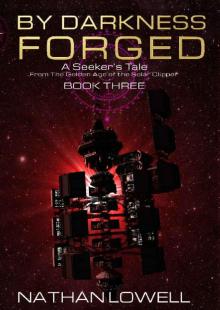 By Darkness Forged (Seeker's Tales from the Golden Age of the Solar Clipper Book 3)
By Darkness Forged (Seeker's Tales from the Golden Age of the Solar Clipper Book 3) The Wizard's Butler
The Wizard's Butler Cape Grace
Cape Grace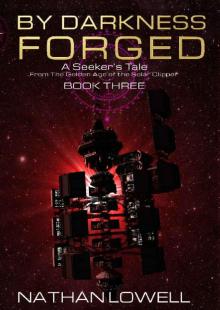 By Darkness Forged
By Darkness Forged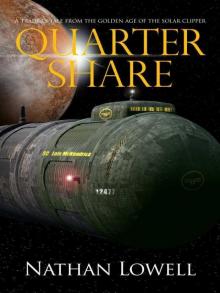 Quarter Share
Quarter Share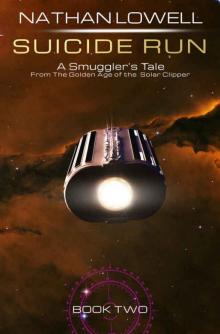 Suicide Run (Smuggler's Tales From the Golden Age of the Solar Clipper Book 2)
Suicide Run (Smuggler's Tales From the Golden Age of the Solar Clipper Book 2)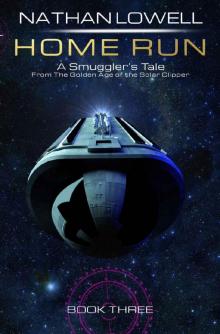 Home Run (Smuggler's Tales From the Golden Age of the Solar Clipper Book 3)
Home Run (Smuggler's Tales From the Golden Age of the Solar Clipper Book 3)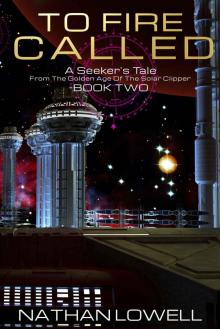 To Fire Called (A Seeker's Tale From The Golden Age Of The Solar Clipper Book 2)
To Fire Called (A Seeker's Tale From The Golden Age Of The Solar Clipper Book 2)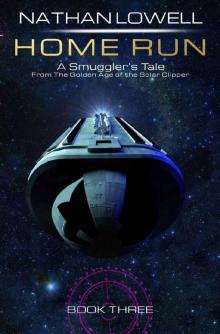 Home Run
Home Run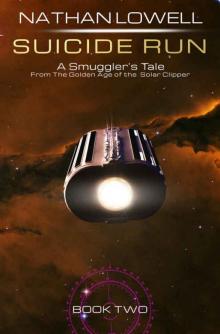 Suicide Run
Suicide Run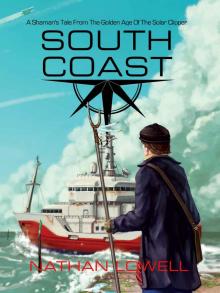 South Coast (Shaman's Tales From The Golden Age Of The Solar Clipper Book 1)
South Coast (Shaman's Tales From The Golden Age Of The Solar Clipper Book 1)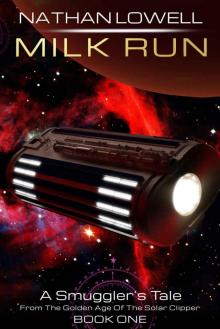 Milk Run (Smuggler's Tales From The Golden Age Of The Solar Clipper Book 1)
Milk Run (Smuggler's Tales From The Golden Age Of The Solar Clipper Book 1) Ravenwood (Tanyth Fairport Adventures)
Ravenwood (Tanyth Fairport Adventures) Captain's Share (Trader's Tales from the Golden Age of the Solar Clipper)
Captain's Share (Trader's Tales from the Golden Age of the Solar Clipper) Owner's Share (Trader's Tales from the Golden Age of the Solar Clipper)
Owner's Share (Trader's Tales from the Golden Age of the Solar Clipper)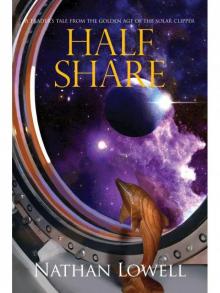 Half Share
Half Share The Hermit of Lammas Wood
The Hermit of Lammas Wood Ravenwood
Ravenwood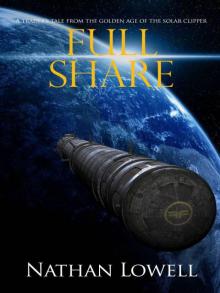 Full Share
Full Share A Light In The Dark (Tales of the Deep Dark)
A Light In The Dark (Tales of the Deep Dark)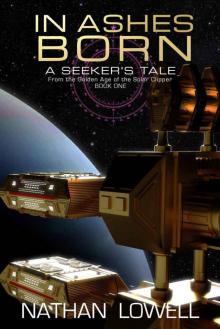 In Ashes Born (A Seeker's Tale From The Golden Age Of The Solar Clipper Book 1)
In Ashes Born (A Seeker's Tale From The Golden Age Of The Solar Clipper Book 1)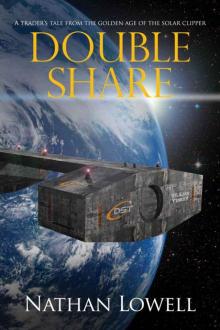 Double Share: Solar Clipper Trader Tales
Double Share: Solar Clipper Trader Tales Zypheria's Call (A Tanyth Fairport Adventure)
Zypheria's Call (A Tanyth Fairport Adventure)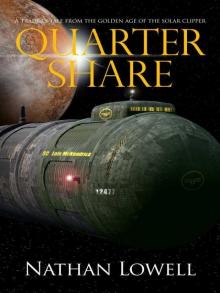 Quarter Share attftgaotsc-1
Quarter Share attftgaotsc-1